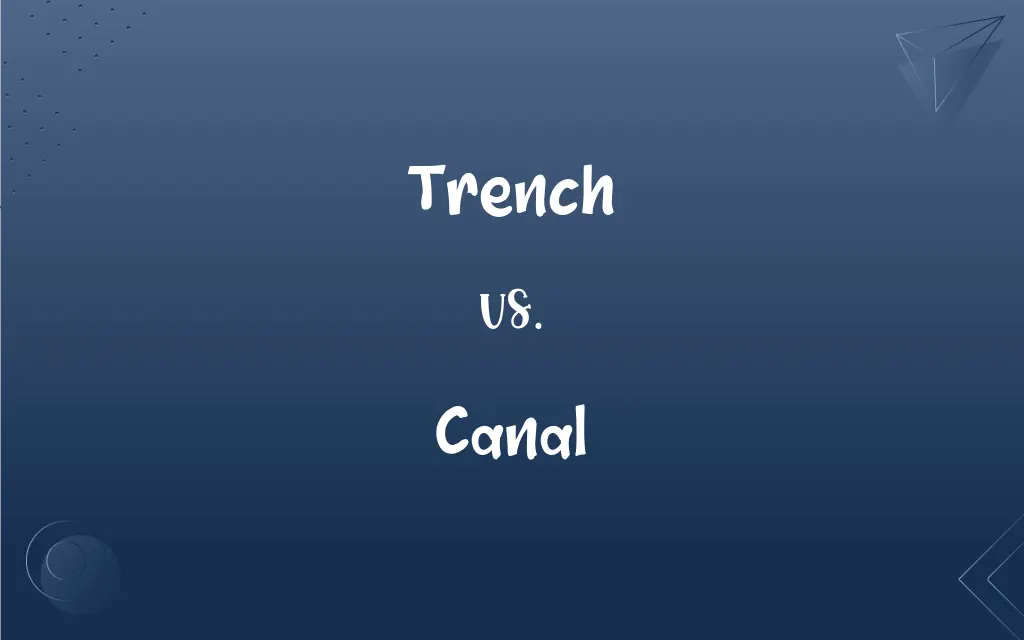Trench vs. Canal: What's the Difference?
By Aimie Carlson & Harlon Moss || Updated on May 29, 2024
A trench is a narrow, deep excavation typically used for military defense or utility installation, whereas a canal is a man-made waterway designed for navigation, irrigation, or water management.

Key Differences
A trench is a narrow, elongated excavation usually dug for various purposes such as military defense, construction, or utility installations. Trenches are often temporary and serve to protect soldiers or house pipelines and cables. On the other hand, a canal is a wide, permanent artificial waterway created primarily for navigation, irrigation, and water management.
Trenches are typically found on land and are characterized by their narrow and deep structure. They are commonly associated with warfare, particularly trench warfare, where soldiers use them for protection and strategic advantage. Conversely, canals are broader and more extensive, facilitating the movement of water and vessels over long distances, essential for trade, agriculture, and flood control.
The construction of trenches involves digging into the ground to create a protective barrier or a conduit for utilities. This process is usually less complex compared to canal construction, which requires extensive planning, excavation, and often involves significant engineering efforts to manage water flow and stability. While trenches are often temporary, canals are designed to be durable and long-lasting structures.
In terms of utility, trenches are primarily functional for land-based operations, providing safety and a means for laying infrastructure. Canals, however, serve a dual purpose of facilitating water transportation and supporting irrigation systems, thereby playing a crucial role in agriculture and commerce.
Comparison Chart
Definition
Narrow, deep excavation
Man-made waterway
ADVERTISEMENT
Primary Use
Military defense, utility installation
Navigation, irrigation, water management
Structure
Narrow and deep
Wide and extensive
Permanence
Often temporary
Permanent
Construction Complexity
Relatively simple
Complex
Trench and Canal Definitions
Trench
A ditch for utility lines.
Workers dug a trench to lay the new gas pipeline.
ADVERTISEMENT
Canal
An artificial watercourse for water management.
The Grand Canal in China is an ancient engineering marvel.
Trench
A long, narrow excavation for defensive purposes.
The army reinforced the trench with sandbags.
Canal
A channel for irrigation.
The farm's canal system ensures adequate water supply.
Trench
A furrow or groove.
The farmer plowed a trench for irrigation.
Canal
A waterway for drainage.
The city built a canal to manage floodwaters.
Trench
A deep furrow or ditch.
Canal
A conduit for transporting goods.
The canal facilitated the movement of goods to inland cities.
Trench
A long narrow ditch embanked with its own soil and used for concealment and protection in warfare.
Canal
An artificial waterway or artificially improved river used for travel, shipping, or irrigation.
Trench
A long, steep-sided valley on the ocean floor.
Canal
(Anatomy) A tube, duct, or passageway.
Trench
To dig or make a trench or trenches in (land or an area, for example).
Canal
(Astronomy) One of the faint, hazy markings resembling straight lines on early telescopic images of the surface of Mars.
Trench
To place in a trench
Trench a pipeline.
Canal
To dig an artificial waterway through
Canal an isthmus.
Trench
To dig a trench or trenches.
Canal
To provide with an artificial waterway or waterways.
Trench
To encroach. Often used with on or upon
"The bishop exceeded his powers, and trenched on those of the king" (Francis Parkman).
Canal
An artificial waterway or artificially improved river used for travel, shipping, or irrigation.
Trench
To verge or border. Often used with on or upon
"a broad playfulness that trenched on buffoonery" (George Meredith).
Canal
(anatomy) A tubular channel within the body.
Trench
A long, narrow ditch or hole dug in the ground.
Canal
(astronomy) One of the faint, hazy markings resembling straight lines on early telescopic images of the surface of Mars; see Martian canals
Trench
(military) A narrow excavation as used in warfare, as a cover for besieging or emplaced forces.
Canal
To dig an artificial waterway in or to (a place), especially for drainage
Trench
(archaeology) A pit, usually rectangular with smooth walls and floor, excavated during an archaeological investigation.
Canal
To travel along a canal by boat
Trench
(informal) A trench coat.
Canal
An artificial channel filled with water and designed for navigation, or for irrigating land, etc.
Trench
To invade, especially with regard to the rights or the exclusive authority of another; to encroach.
Canal
A tube or duct; as, the alimentary canal; the semicircular canals of the ear.
Trench
To excavate an elongated pit for protection of soldiers and or equipment, usually perpendicular to the line of sight toward the enemy.
Canal
A long and relatively narrow arm of the sea, approximately uniform in width; - used chiefly in proper names; as, Portland Canal; Lynn Canal.
Trench
(archaeology) To excavate an elongated and often narrow pit.
Canal
(astronomy) an indistinct surface feature of Mars once thought to be a system of channels; they are now believed to be an optical illusion
Trench
To have direction; to aim or tend.
Canal
A bodily passage or tube lined with epithelial cells and conveying a secretion or other substance;
The tear duct was obstructed
The alimentary canal
Poison is released through a channel in the snake's fangs
Trench
To cut; to form or shape by cutting; to make by incision, hewing, etc.
Canal
Long and narrow strip of water made for boats or for irrigation
Trench
To cut furrows or ditches in.
To trench land for the purpose of draining it
Canal
Provide (a city) with a canal
Trench
To dig or cultivate very deeply, usually by digging parallel contiguous trenches in succession, filling each from the next.
To trench a garden for certain crops
Canal
A man-made waterway for navigation.
The Panama Canal connects the Atlantic and Pacific Oceans.
Trench
To cut; to form or shape by cutting; to make by incision, hewing, or the like.
The wide wound that the boar had trenchedIn his soft flank.
This weak impress of love is as a figureTrenched in ice, which with an hour's heatDissolves to water, and doth lose its form.
Trench
To fortify by cutting a ditch, and raising a rampart or breastwork with the earth thrown out of the ditch; to intrench.
No more shall trenching war channel her fields.
Trench
To cut furrows or ditches in; as, to trench land for the purpose of draining it.
Trench
To dig or cultivate very deeply, usually by digging parallel contiguous trenches in succession, filling each from the next; as, to trench a garden for certain crops.
Trench
To encroach; to intrench.
Does it not seem as if for a creature to challenge to itself a boundless attribute, were to trench upon the prerogative of the divine nature?
Trench
To have direction; to aim or tend.
Like powerful armies, trenching at a townBy slow and silent, but resistless, sap.
Trench
A long, narrow cut in the earth; a ditch; as, a trench for draining land.
Trench
An alley; a narrow path or walk cut through woods, shrubbery, or the like.
In a trench, forth in the park, goeth she.
Trench
An excavation made during a siege, for the purpose of covering the troops as they advance toward the besieged place. The term includes the parallels and the approaches.
Trench
A ditch dug as a fortification having a parapet of the excavated earth
Trench
A long steep-sided depression in the ocean floor
Trench
Any long ditch cut in the ground
Trench
Impinge or infringe upon;
This impinges on my rights as an individual
This matter entrenches on other domains
Trench
Fortify by surrounding with trenches;
He trenched his military camp
Trench
Cut or carve deeply into;
Letters trenched into the stone
Trench
Set, plant, or bury in a trench;
Trench the fallen soldiers
Trench the vegetables
Trench
Cut a trench in, as for drainage;
Ditch the land to drain it
Trench the fields
Trench
Dig a trench or trenches;
The National Guardsmen were sent out to trench
Trench
A narrow excavation in the ground.
Soldiers took cover in the trench during the battle.
Trench
A deep depression in the seabed.
The Mariana Trench is the deepest part of the world's oceans.
FAQs
What is a trench?
A trench is a narrow, deep excavation typically used for military defense or utility installation.
How is a trench different from a canal?
A trench is a narrow, deep excavation mainly for defense or utilities, while a canal is a broad waterway for navigation and irrigation.
What is the purpose of a canal in agriculture?
Canals in agriculture are used for irrigation to supply water to crops.
What is a canal?
A canal is a man-made waterway designed for navigation, irrigation, or water management.
Are canals always filled with water?
Yes, canals are designed to hold and convey water.
What materials are used to build a trench?
Trenches are typically dug into the earth and may be reinforced with wood or metal.
Are trenches used in modern warfare?
Yes, trenches are still used for military defense and strategic purposes.
Can a trench be permanent?
Trenches are usually temporary but can be made permanent for specific uses.
Do canals have historical significance?
Yes, canals have been crucial for trade and agriculture throughout history.
What are some famous trenches?
Famous trenches include those used in WWI, like the Western Front trenches.
What are some famous canals?
Famous canals include the Panama Canal and the Suez Canal.
Canals vs. Rivers: What's the difference?
Canals are man-made, while rivers are natural watercourses.
What materials are used to build a canal?
Canals often require concrete, stone, or metal for construction to ensure durability.
What is a trench's role in construction?
In construction, trenches are used to lay foundations and install utilities.
Do trenches have historical significance?
Yes, trenches have significant historical importance, especially in warfare.
Are trenches only used in warfare?
No, trenches are also used for laying utilities like cables and pipes.
How are trenches constructed?
Trenches are constructed by digging into the ground, often using shovels or excavators.
How are canals constructed?
Canals are built by excavating a pathway and lining it to hold water.
Can trenches be used for drainage?
Yes, trenches can be used to drain water from fields or construction sites.
Canals vs. Aqueducts: What's the difference?
Canals are for navigation and irrigation, while aqueducts are specifically for transporting water.
About Author
Written by
Aimie CarlsonAimie Carlson, holding a master's degree in English literature, is a fervent English language enthusiast. She lends her writing talents to Difference Wiki, a prominent website that specializes in comparisons, offering readers insightful analyses that both captivate and inform.
Co-written by
Harlon MossHarlon is a seasoned quality moderator and accomplished content writer for Difference Wiki. An alumnus of the prestigious University of California, he earned his degree in Computer Science. Leveraging his academic background, Harlon brings a meticulous and informed perspective to his work, ensuring content accuracy and excellence.































































